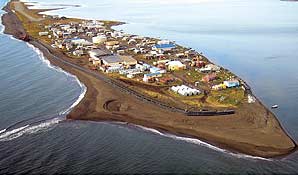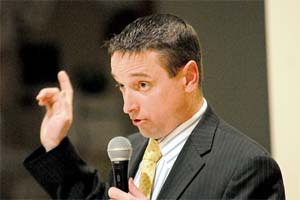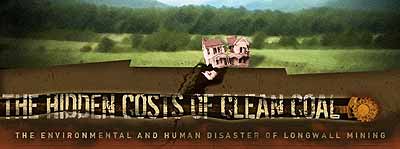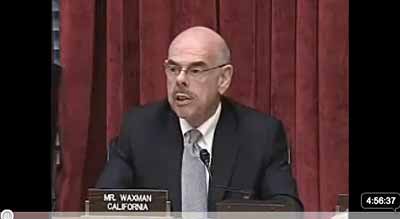Biblio
The tar sands in Alberta are so big they can be seen from space...
H2Oil is a documentary, now on DVD.
“In the vast, pristine forests of Western Canada, the ‘war for water’ has already begun…
Thanks to Alberta’s Athabasca oil sands, Canada is now the biggest oil supplier to the United States. A controversial billion-dollar industry is heavily invested in extracting crude from the tarry sands through a process so toxic it has become an international cause for concern. Four barrels of glacier-fed spring water are used to process each barrel of oil, then are dumped, laden with carcinogens, into leaky tailings ponds so huge they can be seen from space.
Downstream, the people of Fort Chipewyan are already paying the price for what will be one of the largest industrial projects in history. When a local doctor raises the alarm about clusters of rare cancers, evidence mounts for industry and government cover-ups. In a time when wars are fought over oil and a crisis looms over access to clean fresh water, which resource is more precious? And what price are we willing to pay? — Gisèle Gordon.”
And now they want to do this in Utah, though on a smaller scale:
A plan to strip-mine oil sands crude on U.S. land for the first time in northeastern Utah is facing legal challenge.
Through a legal appeal, a pair of local environmental groups are working to overturn a decision earlier this month by John Baza, director of the Utah Division of Oil, Gas and Mining (UDOGM). He upheld a permit approval for a 62-acre mine in the remote Uinta Basin of the Colorado Plateau.
Should the legal option fail, the groups said they are determined to block the project – by whatever “peaceful” means...
See: The End of the World As We Know It? The rise of the post-carbon era
Founded in 1919, Halliburton is one of the world's largest providers of products and services to the oil and gas industry. It employs more than 50,000 people in nearly 70 countries."
See: Halliburton's web site on Hydraulic Fracturing
See: Soucewatch article on Halliburton.
"Halliburton is under Justice Department Securities and Exchange Commission investigation over allegations of improper dealings in Iraq, Kuwait and Nigeria," Whitley Strieber wrote March 12, 2007.
See New York time Editorial on the "Halliburton Loophole". (2009)
See LA Times, "Halliburton's Interests Assisted by White House." (2004)
See. John Collins Rudolf. "E.P.A. Subpoenas Halliburton on Fracking." NYT Green Blog. Nov. 9, 2010.
See: Barry Meier and Clifford Krauss. "Inquiry Puts Halliburton in a Familiar Hot Seat". NYT Business Day. October 28, 2010.
See: Dauda Garuba. "Halliburton, Bribes and the Deceit of 'Zero-Tolerance' for Corruption in Nigeria." African Community of Practice on Managing for Development Results. (cop-mfdr-africa.org). August 26, 2010.
EPA Update. November 9-10 2010
On November 9, 2010, EPA announced that eight out of the nine hydraulic fracturing companies that received voluntary information requests in September agreed to submit timely and complete information to help the Agency conduct its study on hydraulic fracturing. However, the ninth company, Halliburton, has failed to provide EPA the information necessary to move forward with this important study. As a result, and as part of EPA's effort to move forward as quickly as possible, today EPA issued a subpoena to the company requiring submission of the requested information that has yet to be provided.
See: Letter sent by EPA to Halliburton PDF (2pp, 516K).
See: The subpoena sent by EPA to Halliburton PDF (11pp, 3.5M).
Update:
See: FCPA Blog | UK Court Won't Block Telser Extradition
Judson Berger. "Nigeria Drops Bribery Charges Against Cheney, Halliburton After $250M Deal Struck." Canada Free Press. Dec. 21, 2010.
Nigeria’s government has reportedly dropped bribery charges against former Vice President Dick Cheney and Halliburton, the energy firm he once headed, after the company agreed to pay a hefty settlement.
A report on how the Federal Safe Drinking Water was amended by the U.S. Congress in 2005 to exempt hydraulic fracturing from its regulations.
WASHINGTON — Over the last four years, the Bush administration and Vice President Dick Cheney's office have backed a series of measures favoring a drilling technique developed by Halliburton Co., Cheney's former employer.
The technology, known as hydraulic fracturing, boosts gas and oil production and generates $1.5 billion a year for the company, about one-fifth of its energy-related revenue. In recent years, Halliburton and other oil and gas firms have been fighting efforts to regulate the procedure under a statute that protects drinking water supplies.
The 2001 national energy policy report, written under the direction of the vice president's office, cited the value of hydraulic fracturing but didn't mention concerns raised by staff members at the Environmental Protection Agency.
Since then, the administration has taken steps to keep the practice from being regulated under the Safe Drinking Water Act, which Halliburton has said would hurt its business and add needless costs and bureaucratic delays.
An EPA study concluded in June that there was no evidence that hydraulic fracturing posed a threat to drinking water. However, some EPA employees complained about the study internally before its completion, and others have strongly criticized it publicly since its release.
Announcer: Paul Bison agreed back in March to let Chesapeake drill a well on his 80 acres in Keithville.
Paul Bison: Nobody in the section, in the neighborhood is gonna ever benefit unless somebody lets 'em drill and when we leased three years ago, we knew what it was for, we took the money and now it's time for somebody to step up to the plate and help em let it happen.
Fear about environmental damage from Marcellus Shale natural gas drilling is often trained on what could happen deep underground, but some of the gravest hazards posed by the process are driven in trucks, stored in tanks, carried through hoses and left in surface pits at natural gas well sites.
Concentrated chemicals, as well as wastewater containing toxic levels of salts and metals, are stored, produced or transported in large quantities at each well site, creating the potential for tainting drinking water or seeping into ponds and streams.
While recent enforcement action against Cabot Oil and Gas Corp. - the company deemed responsible for methane leaks and nearly two dozen spills in Susquehanna County in the last two years - has drawn attention to the danger of spills, information about the industry-wide frequency and impact has not been reported publicly.
See: Cabot Oil & Gas’s Marcellus Drilling to Slow After PA Environment Officials Order Wells Closed, Lustgarten, Abrahm . ProPublica. (2010.
See: Commonwealth of Pennsylvania DEP takes aggressive enforcement action against Cabot Oil.
Radio Broadcast. Interview with Mayor Calvin Tilman.
Vast new natural gas fields have opened up thanks to an advanced drilling technique. While natural gas is a cleaner burning fuel than coal or petroleum, extracting it is still hard, dirty work.
Some people who live near the massive Barnett Shale gas deposit in north Texas, have complaints. Health and environmental concerns are prompting state regulators to take a closer look.
Includes transcript. 7 min. 18 sec.
See: Dish Mayor Calvin Tilman Testifies at Railroad Commission - Oil and Gas Lawyer Blog.
See: How Should We Do the Mountain?: Who the heck is Calvin Tilman?
Residents of others states are issuing words of warning for New Yorkers who may soon allow companies to use the "fracking" process to drill for natural gas.
I live and work in Marcellus shale ground zero -- central New York State, just south of the Finger Lakes, one of the biggest and best watersheds in the hemisphere. My home is in economically challenged, mostly rural Tioga County, and I work in Tompkins County. Almost all our neighbors for several miles around have signed gas leases. I participate regularly and actively as a client, colleague, patient, or volunteer with businesses, organizations, and institutions in 19 other New York counties.
I have been economically poor and landless, economically comfortable and landless, comfortable and landed, and poor and landed. I've been rural, suburban, and urban. And I've spent most of my adult life paying state and local taxes in New York State (and a whole lot of national taxes, most of which have gone toward things I do not condone).
Writer Maura Stephens lives in the hills outside Spencer, New York. She wrote this using voice recognition software.
The Center for Public Integrity’s year-long investigation into the social and environmental impacts of longwall mining centered on hundreds of pages of documents obtained from government sources, such as the Pennsylvania Department of Environmental Protection and the U.S. Fish and Wildlife Service; legal agreements between coal companies and property owners; environmental studies; landowner letters; and federal and state records requests.
The library features key documents exemplifying key people or issues in each of the project’s magazine articles.
See: Resources Page:
This list of resources includes the websites of coal companies and citizens groups, as well as studies about and lawsuits over the impacts of longwall mining.
Perched on an Alaskan barrier island, the village of Kivalina faces imminent destruction because of melting sea ice.

Kivalina, Alaska, has sued energy companies over
melting sea ice that threatens the town.
AP Photo/Northwest Arctic Borough
Now, the community's legal effort — which pins the blame on energy companies for the change in climate — is in danger as well. So, too, is a pair of high-profile climate-change suits that may be taken up by the U.S. Supreme Court, one involving an effort by Connecticut and other states to reduce greenhouse-gas emissions, the other stemming from Hurricane Katrina.
See: Greenhouse Gas Emissions Case Heads to Supreme Court.
See: SCOTUS (Supreme Court of the United States) Blog.
All three suits rely upon the theory that climate change is a public nuisance and, therefore, state and local governments, as well as individuals who have been harmed, can sue for damages or injunctions. The Obama administration, in a recently filed brief in the Connecticut case, American Electric Power v. Connecticut, is arguing that it may not be prudent for the high court to allow these types of cases to go forward.
If the justices grant review, the stage could be set for reversal of a rare, recent high court victory for environmentalists, the 2007 decision in Massachusetts v. Environmental Protection Agency. The 5-4 ruling in the Massachusetts case found a special standing to sue for states that brought that first global-warming case to the Supreme Court. The majority also held that the Environmental Protection Agency (EPA) had authority under the Clean Air Act to regulate greenhouse-gas emissions.
"If the solicitor general gets the Court to take cert, I would be very confident they're going to undercut Massachusetts v. EPA," said environmental scholar Randall Abate of Florida A&M University College of Law. "The sooner the Court gets to revisit it, the more likely it will be gutted. The trend has been to be more restrictive on standing. This is really making the environmental community nervous and angry."
The Katrina-related case — In re Ned Comer — is also at the Supreme Court but is coming to justices in an unusual fashion — through a petition for a writ of mandamus. The Alaska case — Native Village of Kivalina v. Exxon Mobil Corp. — is undergoing briefing in the U.S. Court of Appeals for the 9th Circuit.
 "Each case has its legal strong points and each has its legal vulnerabilities," said James May of Widener University School of Law, who has filed amicus briefs on behalf of environmental law professors in the Connecticut and Kivalina cases.
"Each case has its legal strong points and each has its legal vulnerabilities," said James May of Widener University School of Law, who has filed amicus briefs on behalf of environmental law professors in the Connecticut and Kivalina cases.
"As a federal litigator for 15 years and a law professor for 20, what I find concerning is the executive branch stepping in front of states and private litigants who are trying to get their day in court. If this was the Bush administration doing this, I think it would be a very divisive political issue."
...The energy companies' case is now stronger because of the EPA's actions and the solicitor general's brief, he said. "I don't know if it gets you there finally. If I was writing plaintiffs' briefs, I would be pounding the table and saying, `If you're telling me this is a political question, the political arm to deal with this is Congress and they have done nothing.' "
 Which is exactly what Pawa, who represents three land trusts in the Connecticut case as well as the Kivalina villagers, said. "The solicitor general's brief is not very damaging because it was unpersuasive," Pawa said. "It's just wrong. It tries to repackage the political-question doctrine, which was thoroughly dealt with on its merits by the 2d Circuit, as prudential standing.
Which is exactly what Pawa, who represents three land trusts in the Connecticut case as well as the Kivalina villagers, said. "The solicitor general's brief is not very damaging because it was unpersuasive," Pawa said. "It's just wrong. It tries to repackage the political-question doctrine, which was thoroughly dealt with on its merits by the 2d Circuit, as prudential standing.
"And, there are no federal regulations applicable to existing coal-fired power plants. They haven't even been proposed. There have been some rules proposed for new plants, but no rules for existing plants, which are at issue in these lawsuits."
In looking at the various iterations of climate-change litigation, the most "evolved" of the three cases is Kivalina, according to Jones and others, and the one that worried most corporate defendants. "It contained a conspiracy count, which is what the plaintiffs' bar hoped would get them money damages," Jones said. "And it has more sympathetic and real plaintiffs than the other cases. Here you have a particular village that is going to be under water."
Kivalina from Cristina Valdivieso + Jon Connor on Vimeo.
Various scientific and government studies report that the right combination of storms could flood the entire village at any time and have recommended relocation at costs varying up to $400 million.
If the Court does not act on Connecticut or Comer, Jones said, "I think Kivalina will go forward. I think that one could end up being the most dangerous of any of them. But getting into court is one thing; proving causation is a very hard row to hoe."
See: Shearer, Christine. "My Journey Into Kivalina v. ExxonMobil et al." Countercurrents. Dec. 1, 2010.
See also: Shearer, Christine. Kivalina: A Climate Change Story. Haymarket Books, 2011. Print.
This paper reviews the history of litigation concerning hydraulic fracturing.
LEAF Petitions EPA to Withdraw Primacy—1994
In 1994, an organization known as Legal Environmental Assistance Foundation (hereinafter referred to as “LEAF”) petitioned EPA to initiate proceedings to withdraw approval of the Alabama UIC program.
LEAF alleged that the Alabama program was deficient because it did not regulate hydraulic fracturing activities associated with coalbed methane gas production and the federal Safe Drinking Water Act (hereinafter referred to as “SDWA”).
LEAF further alleged that the SDWA required regulation under federal guidelines over hydraulic fracturing operations. In 1995, EPA denied the petition because it determined that hydraulic fracturing did not fall within the definition of "underground injection" under the SDWA.
EPA had concluded that methane gas production wells, which are also used for hydraulic fracturing of the coalbeds, are not required to be regulated under the SDWA because the principal function of these wells is not the underground emplacement of fluids; their principal function is to produce coalbed methane gas.
See: IADC. "Alabama lawsuit poses threat to hydraulic fracturing across U.S." Drilling Contractor. Jan/Feb. 2000.
See: Affirming Gasland
Evidence that Pennsylvania’s Department of Homeland Security is working on behalf of the natural gas industry came to light in early September when internal department bulletins were leaked to an anti-drilling listserve. The department had contracted an Israeli-linked agency to spy on anti-drilling activists.
The story was later leaked to reporters at Pro Publica and the City Paper. These papers’ articles suggested a direct connection between the state agency and the natural gas industry. The exposure fueled outrage from targeted groups.
Gov. Ed Rendell had to retreat. On Sept. 14, he held a press conference to apologize to groups who had been monitored. “Protesting is not a threat, it’s an American right,” said Rendell. He said he was “appalled” and announced that the state would not renew its $125,000 no-bid contract with the Institute of Terrorism Research and Response, set to expire in October.
See: Pa. Governor Apologizes for Tracking Enviro Extremists, but Questions Remain - ProPublica
Today, Republicans in the House energy committee voted not once, not twice, but three times [all PDFs], against amendments recognizing that climate change is real, despite the broad scientific consensus that "climate change is happening and human beings are a major reason for it." They then unanimously voted [PDF] in favor of the Upton-Inhofe bill to repeal the EPA's scientific endangerment finding on greenhouse pollution.
The 31 Republicans and three Democrats who voted in favor of H.R. 910 have received a grand total of $343,750 from Koch Industries, an average of more than $10,000 each. Freshman Mike Pompeo (R-Kan.), Koch's special man in Congress, tips the scales at $79,500.
But today's vote is not the first time the Commitee From Koch went public on their science denial.
[Following is] a survey of the members of the committee, fueled by support from Koch Industries and other polluters, and their proclaimed opposition to climate science and climate scientists...
See for yourself. Chairman Upton, Rep. Barton, Rep. Waxman, et al. "Full Committee Markup on "H.R. 910" and "H.J. Res. 37" (Continued)". YouTube. (Running Time - 4:56:37).
See: Comments from Committe on Energy and Commerce Democrats:
Letter in Opposition from Scientists: "The EPA must be allowed to fulfill its responsibilities and take action to regulate global warming emissions under the Clean Air Act. This science-based law has prevented 400,000 premature deaths and hundreds of millions of cases of respiratory and cardiovascular disease during the 40 years since it was first passed5—all without diminishing economic growth."
Letter in Opposition from National Academy of Sciences: "We are deeply disturbed by the recent escalation of political assaults on scientists in general and on climate scientists in particular. All citizens should understand some basic scientific facts."
Letter in Opposition from Former Senior Military Officers: "America’s dependence on oil constitutes a clear and present danger to the security and welfare of the United States. As former senior military officers, we are concerned about Congressional efforts to undermine the Environmental Protection Agency’s regulatory authority that is critical to reducing our dependence on oil."
Letter in Opposition from Health and Medical Professionals: "Please fulfill the promise of clean, healthy air for all Americans to breathe. Support full implementation of the Clean Air Act and resist any efforts to weaken, delay or block progress toward a healthier future for all Americans."
Letter in Opposition from the American Public Health Association: "Cimate change is a public health issue and is one of the greatest threats to human health. Scientists from across the globe have stated in the strongest possible terms that the climate is changing and that human activity is to blame."
Letter in Opposition from Organizations: "This reckless legislation puts America’s health, prosperity, and national security at risk by gutting the Clean Air Act, overturning a decision of the Supreme Court, and dismantling the Environmental Protection Agency’s ability to address life-threatening carbon dioxide and other pollution."
Letter in Opposition from Health Organizations: "This legislation would block the EPA from setting sensible safeguards to protect public health from the effects of air pollution."
Letter in Opposition from the American Lung Association: "A recent bipartisan survey... indicates the overwhelming view of voters: 69 percent think the EPA should update Clean Air Act standards with stricter limits on air pollution; 64 percent feel that Congress should not stop the EPA from updating carbon dioxide emission standards; 69 percent believe that EPA scientists, rather than Congress, should set pollution standards."
See: Broder, John M. 2011. House Panel Votes to Strip E.P.A. of Power to Regulate Greenhouse Gases. The New York Times, March 10, sec. Science / Environment.
See: Reeve, Elspeth. 2011. House Energy Panel Curbs Federal Power to Fight Climate Change - Politics - The Atlantic Wire. The Atlantic Wire. March 16.
See: EPA chief faces hostile House GOP
See: Smackdown: climate science vs. climate economics.
See: Climate Co-benefits and Child Mortality Wedges.
See: Snubbing Skeptics Threatens to Intensify Climate War,
See: Climate Zombies Now Run The House.
See: GOP Budget Amendments Would Destroy Health, Economy, Planet
See: EPA chief faces hostile House GOP
See: Energy & Commerce Committee Investigates Potential Impacts of Hydraulic Fracturing
For one of the more articulate conservative bloggers viewpoints on climate change and its' hermeneutics, read Alberta, Canada's Kevin Libin at ClimateRealists and The National Post.
See: Libin, Kevin. 2011. "Kevin Libin: Environmental activists hide behind a screen of U.S. money." National Post.
For an embarassing account of the dangers of environmentalism, see: Beware The Green Dragon! | Right Wing Watch.
"Who the Heck is Calvin Tillman?"
"...Texas allows public domain seizure for pipelines. The many pipelines feeding the compressors cross private property rendering it unfit for future development.
The cumulative effect of the gas industry on the residents and their property values has caused Calvin, their mayor, to refer to Dish as a Sacrifice Zone.
Pennsylvania based blog. Includes many links and articles.
- About the writer
- Informational Links
- Listening Projects, Video and Stories
- Maps and Images
- More Blogs
- Take Action!
Updated frequently.
Blogroll links to
Categories include:
- Drilling in NY (28)
- Drilling in other places (26)
- drilling in pa (167)
See: Dish Mayor Calvin Tilman Testifies at Railroad Commission - Oil and Gas Lawyer Blog.
On 9-15-10, attending the EPA meeting on hydraulic fracturing for shale gas, professor of ecology and environmental biology, independent scientist Robert Howarth, Ph.D.,

told a news conference that natural gas extracted from shale is nearly as dirty as coal or perhaps even dirtier in terms of greenhouse gas footprint...
good grief:
...Our public comment to EPA was, in part, as follows:
Based on what we know so far, the EPA should order immediate suspension of high-volume hydrofracking until your study is complete. Let science guide policy. Otherwise we’re conducting a massive human, animal and earth experiment.
The gas will be there; it's not going away. Ideally any further carbon extraction at all should be banned while we accelerate development of sustainables but since that's probably not in the cards politically, it's imperative we at least do everything we can to reduce the harm we are doing to ourselves and our environment by extending our carbon binge in shale gas extraction. As others have mentioned,
I especially urge you to incorporate into your study the research of Prof. Robert Howarth and his team at Cornell on the methane greenhouse footprint that makes shale gas look nearly as dirty as coal if not even worse.
1976 video clip of M King Hubbert speaking about world oil depletion and explaining the concept of peak oil.
See article on the Energy Policy Act (2005).





















